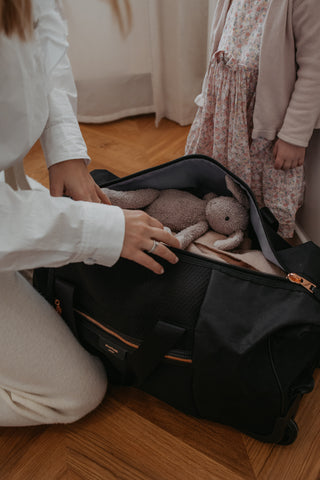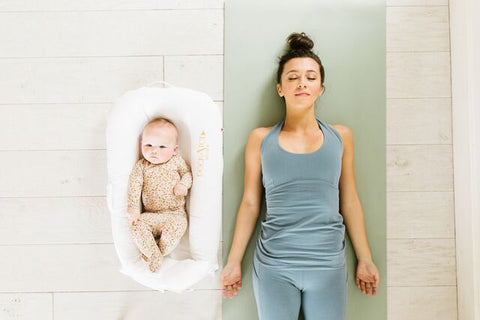If you’re entering your third trimester and feeling completely clueless about what to pack in your hospital bag, don’t panic. It’s perfectly normal to feel the need to prepare for every eventuality. But the reality is that you won’t be left helpless and without basic levels of care, should you end up in a last-minute-mad-dash to deliver your baby. Friends and family will rally, medical professionals will be at hand, and you won’t be left to fend for yourself.
It’s worth consulting your midwife and booking a tour of the maternity unit at your local hospital. You’ll be able to ask what you need to bring with you and what’s already provided.
Here are two checklists for packing your hospital bag - one for you, one for your baby. We recommend preparing and packing three to four weeks before your due date.
What do I pack in my hospital bag?

Essentials for you
- Maternity notes - you’ll already have these in a folder, containing key, personal medical information and notes from your midwife. It’s useful to keep this close by in your final trimester for any eventuality.
- Loose, comfy clothing for labour. Nothing too restrictive or hot - something like a loose t-shirt or nightie.
- Phone and charger - for your ‘announcement’ calls to friends and family, and for all those adorable newborn moments you’ll be capturing on camera.
- Toiletry bag - toothbrush and toothpaste, lip balm, soap, hair brush and deodorant.
- Drinks and healthy snacks - for both you and your birthing partner. Keep hydrated and fueled. Feel free to sneak in some chocolate too! We won’t tell.
- Book/ magazine, podcasts and playlists - for the early stages of labour.
- Maternity or nursing pillow - extra comfort for the before and after moments.
- Large knickers (maybe a few disposable ones too) and extra-absorbent sanitary/ maternity pads - you’ll probably need more than you think and it’s worth having a couple of boxes at home too.
- Nursing bras and breast pads, if you’re planning on breastfeeding. Get professionally fitted - you’re likely to go up a few cup sizes.
- Nursing nightie, dressing gown and slippers - keep warm and comfortable while you navigate the first few postnatal days.
- Tens machine or birthing ball, if not supplied by the hospital.
- Outfit to go home - your uterus takes 6-8 weeks to return to its normal size, so you’ll still need your maternity clothes.
Essentials for baby
- Selection of sleep-suits - maybe put aside a special first outfit for those first photographs (although we guarantee you won’t stop snapping away!). Check out this photo blanket.
- Vests - short sleeved or long sleeved depending on the weather. A rule of thumb is to dress your baby in one more layer than you are wearing.
- Hats, scratch mitts and booties. It’s such fun choosing and packing adorable little accessories to keep them warm.
- Selection of muslin blankets. Muslin blankets are advised for the first few months as they are breathable and minimise the risk of your baby overheating, and they get softer after each wash.
- Disposable nappies and lots of them! It’s worth considering reusable nappies for when you get home as they are much kinder to the environment. It seems daunting to first set up, but once you get the hang of it, there’s no turning back.
- Cotton wool and a little bowl to fill with water. Plain water is recommended for the first few weeks’ changing nappies instead of wet wipes which can be unkind to your baby’s skin.
- Muslin squares for mopping up any messy moments.
- Snowsuit for leaving the hospital during the winter months.
- Car seat - you won’t be able to leave the hospital without one. Make sure you know how to fit it - either into your own car or a taxi.
- Changing mat - perfect for changing your baby on the hospital bed and keeping in your bag for future on-the-go moments.
Help is at hand
Whilst it’s important to prepare practically for your birth, it’s also worth preparing emotionally for the postnatal stage, when you’re processing new emotions and responsibilities.
Here's the list of organizations who provide postnatal care in the UAE:
